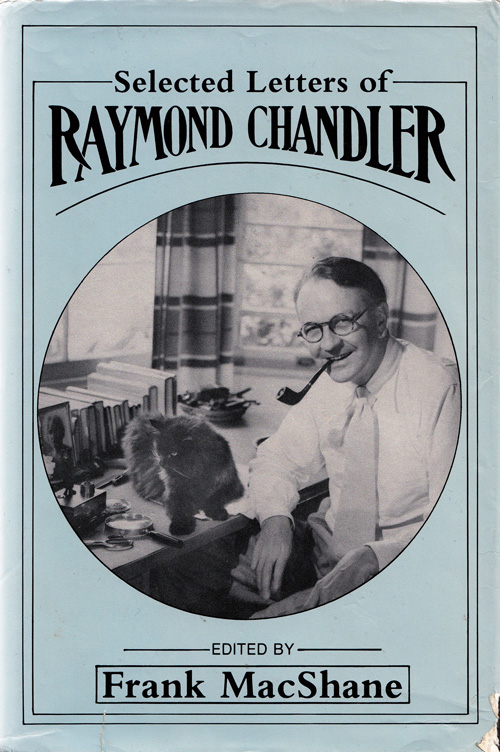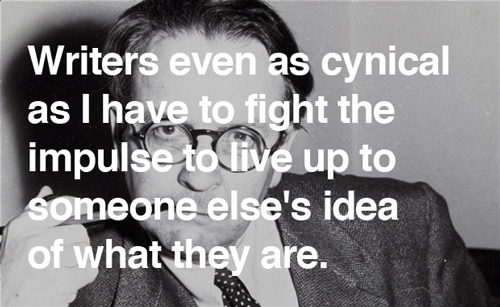by Maria Popova
“The test of a writer is whether you want to read him again years after he should by the rules be dated.”
 Last week, while researching this omnibus of what famous authors wrote about their beloved pets in their letters and journals, I came upon the irresistible 1981 anthology Selected Letters of Raymond Chandler (public library). Among Chandler’s many musings, exchanged with his agents, publishers, and literary friends are a number of timeless insights on writing, culled here as a fine addition to this master-list of famous writers’ advice on writing.
Last week, while researching this omnibus of what famous authors wrote about their beloved pets in their letters and journals, I came upon the irresistible 1981 anthology Selected Letters of Raymond Chandler (public library). Among Chandler’s many musings, exchanged with his agents, publishers, and literary friends are a number of timeless insights on writing, culled here as a fine addition to this master-list of famous writers’ advice on writing.In a 1937 letter to the editor of The Fortnightly Intruder, Chandler echoes Virginia Woolf’s case for the evolution of language:
That you should have pride in your purer American heritage of language seems to me a slight thing. Latin became corrupt, but French is a sharper language than Latin ever was. The best writing in English today is done by Americans, but not in any purist tradition. They have roughed the language around as Shakespeare did and done it the violence of melodrama and the press box. They have knocked over tombs and sneered at the dead. Which is as it should be. There are too many dead men and there is too much talk about them.In a 1948 letter to Hamish Hamilton, Chandler’s English publisher, he revisits the subject:
If I hadn’t grown up on Latin and Greek, I doubt if I would know so well how to draw the very subtle line between what I call a vernacular style and what I should call an illiterate or faux naif style. There’s a hell of a lot of difference, to my mind.In a vital meditation on defining one’s own success, Chandler admonishes against pursuing prestige rather than authenticity, which for him is a serious creative block:
I can’t seem to get started on doing anything. Always very tough for me to get started. The more things people say about you the more you feel as if you were writing in an examination room, that it didn’t belong to you any more, that you had to protect critical reputations and not let them down. Writers even as cynical as I have to fight the impulse to live up to someone else’s idea of what they are.

In a 1951 letter to his agent, Carl Brandt, Chandler once again shares his creative block but, like Rilke, welcomes the state of creative doubt and uncertainty, which Keats famously called “negative capability”:
I am having a hard time with the book. Have enough paper written to make it complete, but must do all over again. I just didn’t know where I was going and when I got there I saw that I had come to the wrong place. that’s the hell of being the kind of writer who cannot plan anything, but has to make it up as he goes along and then try to make sense out of it. If you gave me the best plot in the world all worked out I could not write it. It would be dead for me.In March of 1957, at the age of 69 and critically acclaimed, Chandler revisits this state of creative restlessness and uncertainty as a pillar of his identity as a writer:
I am the same man I was when I was a struggling nobody. I feel the same. I know more, it is true, break all the rules and get away with it, but that doesn’t make me important. I may have written the most beautiful American vernacular that has ever been written (some people think I have), but if it is so, I am still a writer trying to find his way through a maze. Should I be anything else? I can’t see it.More
4 comments:
Can I follow your blog and receive new posts? If so, I'm not sure how to do that and would appreciate some help. Enjoyed today, which was sent to me by a friend.
Sure Sue, but I need your e-mail address.
Best,
I'm reluctant to leave it on the open forum--is that what I need to do?
I can understand that but somehow you need to let me know your address so I can add you to the list of people I e-mail each day with my list of contents on the blog for that day. Where do you live? Are you on Facebook? If so you could send me a message via Facebook.
Post a Comment